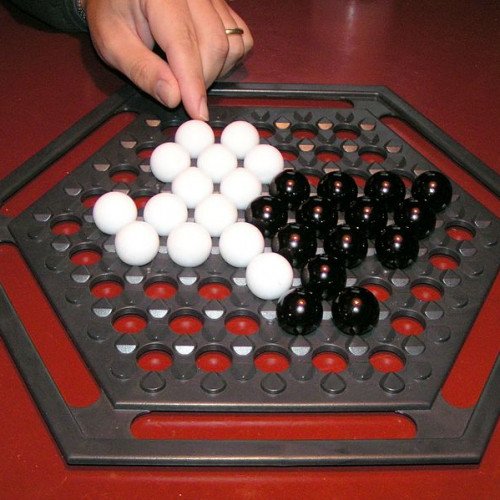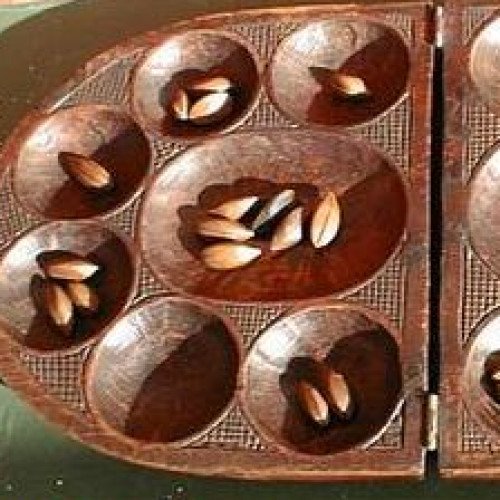ABALONE VS OWARE

ABALONE
Abalone is a two-player abstract strategy board game designed by Michel Lalet and Laurent Lévi in 1987. Players are represented by opposing black and white marbles on a hexagonal board with the objective of pushing six of the opponent's marbles off the edge of the board. Abalone was published in 1990 and has sold more than 4.5 million units. The year it was published it received one of the first Mensa Select awards. It is currently sold in more than thirty countries. The board consists of 61 circular spaces arranged in a hexagon, five on a side. Each player has 14 marbles that rest in the spaces and are initially arranged as shown below, on the left image. The players take turns with the black marbles moving first. For each move, a player moves a straight line of one, two or three marbles of one color one space in one of six directions. The move can be either broadside / arrow-like (parallel to the line of marbles) or in-line / in a line (serial in respect to the line of marbles), as illustrated below. A player can push their opponent's marbles (a "sumito") that are in a line to their own with an in-line move only. They can only push if the pushing line has more marbles than the pushed line (three can push one or two; two can push one). Marbles must be pushed to an empty space (i.e. not blocked by a marble) or off the board. The winner is the first player to push six of the opponent's marbles off of the edge of the board.
Statistics for this Xoptio

OWARE
Oware is an abstract strategy game among the Mancala family of board games (pit and pebble games) played worldwide with slight variations as to the layout of the game, number of players and strategy of play. Its origin is uncertain but it is widely believed to be of Ashanti origin. Played in the Bono Region, Bono East Region, Ahafo Region, Central Region, Western Region, Eastern Region, Ashanti Region of Ghana and throughout the Caribbean, Oware and its variants have many names - Ayò, Ayoayo (Yoruba), Awalé (Ivory Coast, Benin), Wari (Mali), Ouri, Ouril or Uril (Cape Verde), Warri (Caribbean) Pallanguzhi (India) Wali (Dagbani), Adji (Ewe), Nchọ/Ókwè (Igbo), ise (Edo), Awale in (Ga) meaning Spoons in English according to the Ga name for the game. A common name in English is Awari but one of the earliest Western scholars to study the game, Robert Sutherland Rattray, used the name Wari. The game requires an oware board and 48 seeds. A typical oware board has two straight rows of six pits, called "houses", and optionally one large "score" house at either end. Each player controls the six houses on their side of the board, and the score house on their end. The game begins with four seeds in each of the twelve smaller houses. Boards may be elaborately carved or simple and functional; they may include a pedestal, or be hinged to fold lengthwise or crosswise and latch for portability and storage with the seeds inside. While most commonly located at either end, scoring houses may be placed elsewhere, and the rows need not be straight. When a board has a hinged cover like a diptych, the scoring houses may be carved into the two halves of the cover, and so be in front of the players during play. The ground may also be used as a board; players simply scoop two rows of pits out of the earth. In the Caribbean, the seeds are typically nickernuts, which are smooth and shiny. Beads and pebbles are also sometimes used. In the West, some cheaper sets use oval-shaped marbles. Some tourist sets use cowrie shells. The game starts with four seeds in each house. The objective of the game is to capture more seeds than one's opponent. Since the game has only 48 seeds, capturing 25 is sufficient to win the game. Since there is an even number of seeds, it is possible for the game to end in a draw, where each player has captured 24.